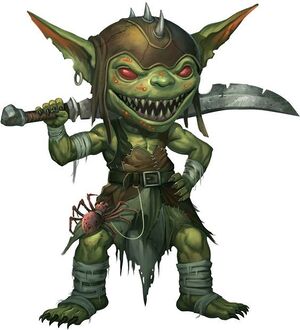m (added Category:Monsters using HotCat) |
No edit summary |
||
| Line 1: | Line 1: | ||
{{Worldbuilders}} {{Infobox_character|affilliation=loyal to the dragon "Longfang"|name={{PAGENAME}}|image=Cheshire_Goblin.jpg|caption=A typical unarmored Cheshire Goblin|languages=goblin, Common}} |
{{Worldbuilders}} {{Infobox_character|affilliation=loyal to the dragon "Longfang"|name={{PAGENAME}}|image=Cheshire_Goblin.jpg|caption=A typical unarmored Cheshire Goblin|languages=goblin, Common}} |
||
'''{{PAGENAME}} '''are a variant goblin that were first seen in Isonhound in 825 PR. In 825 PR strange mutated goblins began appearing in and around the foothills of the Northern Snowy Mountains. These goblins were discovered by scouts who were deployed by the Order of the Watchful Eye based in Gammelgard. The scouts had been sent into the mountains to determine if historical records, held by scholars of the order, accurately depicted the long forgotten entryways into the long great dwarven citadel under the mountains. |
'''{{PAGENAME}} '''are a variant [[goblin]] that were first seen in [[Isonhound]] in 825 [[PR]]. In 825 PR strange mutated goblins began appearing in and around the foothills of the Northern Snowy Mountains. These goblins were discovered by scouts who were deployed by the Order of the Watchful Eye based in [[Gammelgard]]. The scouts had been sent into the mountains to determine if historical records, held by scholars of the order, accurately depicted the long forgotten entryways into the long great dwarven citadel under the mountains. |
||
Due to the presence of these goblins, adventurers were hired to continue the investigation of the entrances and clear them away from the area. A dwarf master alchemist in service to the order, Falgrim Norest, was assigned the responsibility of deploying the adventuring groups and overseeing their reports upon their return. Falgrim also tasked the groups with returning goblin specimens if possible so that he might study them and determine their origin. |
Due to the presence of these goblins, adventurers were hired to continue the investigation of the entrances and clear them away from the area. A dwarf master alchemist in service to the order, Falgrim Norest, was assigned the responsibility of deploying the adventuring groups and overseeing their reports upon their return. Falgrim also tasked the groups with returning goblin specimens if possible so that he might study them and determine their origin. |
||
| Line 8: | Line 8: | ||
== ORIGINS == |
== ORIGINS == |
||
It was determined that these goblins were not normally occurring creatures. Through Falgrin’s studies he recognized signs of alchemical modifications. Due to the unique nature of each alchemist’s techniques, Falgrim was able to determine a possible suspect in the creation of these modified goblins. The Order of the Watchful Eye, along with the city guard of Gammelgard issued a Writ of Detainment for one Horatio Cheshire, a human alchemist. |
It was determined that these goblins were not normally occurring creatures. Through Falgrin’s studies he recognized signs of alchemical modifications. Due to the unique nature of each alchemist’s techniques, Falgrim was able to determine a possible suspect in the creation of these modified goblins. The Order of the Watchful Eye, along with the city guard of Gammelgard issued a Writ of Detainment for one [[Horatio Cheshire]], a human alchemist. |
||
Due to the information that the adventurers had brought back, it had been determined that these creatures were created for a green dragon that goes by the name |
Due to the information that the adventurers had brought back, it had been determined that these creatures were created for a green dragon that goes by the name [[Long Fang]]. |
||
==Physical Appearance== |
==Physical Appearance== |
||
Revision as of 21:52, 14 March 2024
| Languages | goblin, Common |
|---|---|
| Affiliations | loyal to the dragon "Longfang" |
Cheshire's Goblins are a variant goblin that were first seen in Isonhound in 825 PR. In 825 PR strange mutated goblins began appearing in and around the foothills of the Northern Snowy Mountains. These goblins were discovered by scouts who were deployed by the Order of the Watchful Eye based in Gammelgard. The scouts had been sent into the mountains to determine if historical records, held by scholars of the order, accurately depicted the long forgotten entryways into the long great dwarven citadel under the mountains.
Due to the presence of these goblins, adventurers were hired to continue the investigation of the entrances and clear them away from the area. A dwarf master alchemist in service to the order, Falgrim Norest, was assigned the responsibility of deploying the adventuring groups and overseeing their reports upon their return. Falgrim also tasked the groups with returning goblin specimens if possible so that he might study them and determine their origin.
Two groups returned from their adventures successfully. Not only had they found the entrances but they also recovered goblin remains that were dissectable.
ORIGINS
It was determined that these goblins were not normally occurring creatures. Through Falgrin’s studies he recognized signs of alchemical modifications. Due to the unique nature of each alchemist’s techniques, Falgrim was able to determine a possible suspect in the creation of these modified goblins. The Order of the Watchful Eye, along with the city guard of Gammelgard issued a Writ of Detainment for one Horatio Cheshire, a human alchemist.
Due to the information that the adventurers had brought back, it had been determined that these creatures were created for a green dragon that goes by the name Long Fang.
Physical Appearance
Cheshire’s Goblins have distinctly different features from those of naturally occurring goblins.
The most identifiable by far is the larger, oblong head. Additionally, three other aspects of their head that have been altered are their mouth, teeth and eyes. Their teeth have been significantly increased in size and sharpness. Poison glands have been grafted into their cheeks and jaw lines that secretes a toxin onto their teeth enhancing the damage of their bite. Their jaws have been expanded to accommodate these new teeth and glands as well as provide a shape that maximizes the effectiveness of their bites. Finally, their eyes are an unusual shade of red. The intent of this mutation is, as of 825, unknown.
Though the height of Cheshire’s Goblins are comparable to traditional goblins, overall physique is much more svelte. Musculature findings suggest the strength of these goblins to be, on average, comparable or better than the strength of a trained guardsmen.
With this strong frame though comes the issue of appetite. It is believed that these goblins require significantly more food to survive than their natural counterparts. Signs of their presence in the wild could very likely be seen in the overhunting of both small and large game animals.
Personality/Society
Little is known of any societal aspects of these altered goblins. Based on encounters, it is assumed there is a hierarchy in place. “Bosses” or “Chiefs” have been seen ordering and commanding the goblins. Though their effectiveness at this is still in question. They are easily identifiable with a plumage of bone or wood on their backs that have been carved to represent long teeth. This may be in reference to the master they have claimed to serve, a dragon named Longfang.
Some goblins have been shown to effectively wield armor and shields as well as coordinate their attacks with each other. Their effectiveness with this has varied. It would seem not all goblins take to fighting in concert with each other.
Languages
Cheshire's Goblins are known to speak both Goblin and Common.

